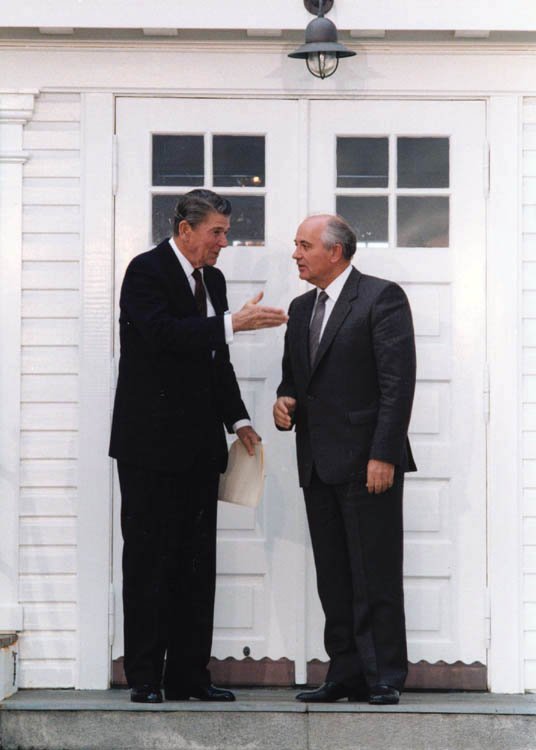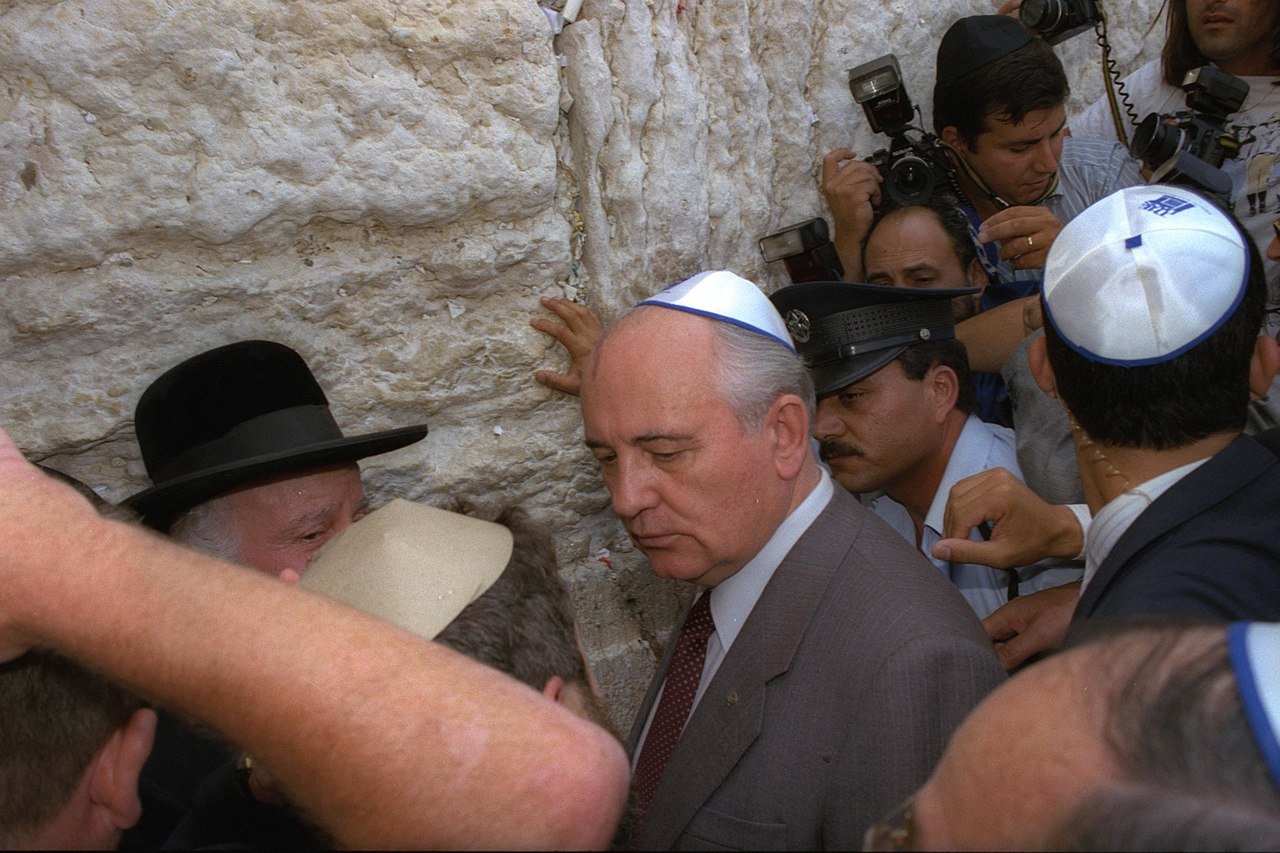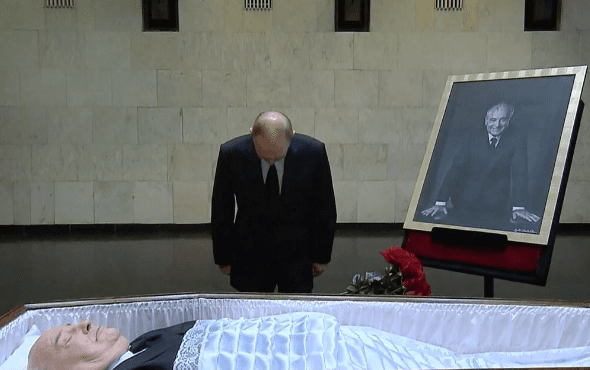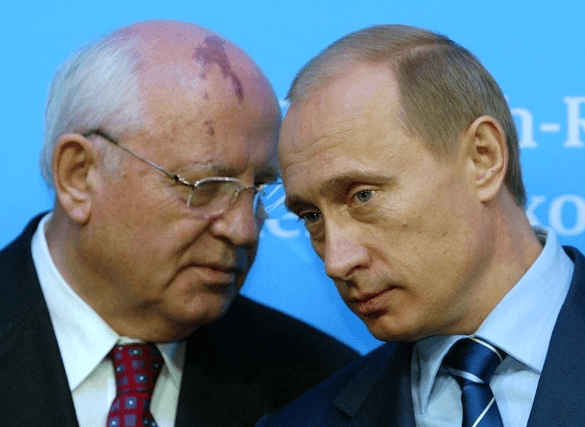Mikhail Sergeyevich Gorbachev, Russian politician and the last leader of the Soviet Union (1985-1991). Ideologically, Gorbachev was initially committed to Marxism-Leninism, but in the early 1990s he turned to social democracy.

Gorbachev’s reforms, called perestroika and glasnost, ended the Cold War, but these reforms led to the Communist Party of the Soviet Union losing its political supremacy in the country and the subsequent dissolution of the Soviet Union. He won the Nobel Peace Prize in 1990. He is on the list of the top 100 most written about people.
Born on March 2, 1931 in the village of Privolnoye in the Stavropol region of the North Caucasus, he received his primary education in his village. In 1952, he joined the Communist Party of the Soviet Union (CPSU). In 1955, he graduated from Moscow University Faculty of Law. He took part in the Union of Young Communists in Stavropol. In 1970 he became the first secretary of the Stavropol organization. In 1971 he was elected a member of the CPSU Central Committee. In 1978 he entered the secretariat as an agricultural officer. He was elected a reserve member of the Politburo in 1979 and a full member in 1980. Upon Chernenko’s death in 1985, he became Secretary General of the CPSU. His policies of glasnost (openness) and perestroika (restructuring) caused great repercussions in the world. He also assumed the presidency in October 1988.
Early years and youth
Born on March 2, 1931 in the village of Privolnoye in the Stavropol region of the North Caucasus, he received his primary education in his village. In 1952, he joined the Communist Party of the Soviet Union (CPSU). In 1955, he graduated from Moscow University Faculty of Law. He took part in the Union of Young Communists in Stavropol. In 1970 he became the first secretary of the Stavropol organization. In 1971 he was elected a member of the CPSU Central Committee. In 1978 he entered the secretariat as an agricultural officer. He was elected a reserve member of the Politburo in 1979 and a full member in 1980. Upon Chernenko’s death in 1985, he became Secretary General of the CPSU. His policies of glasnost (openness) and perestroika (restructuring) caused great repercussions in the world. He also assumed the presidency in October 1988.
Soviet leader
Mikhail Gorbachev began to be criticized by the reformist members of the CPSU for failing to make visible progress in the country’s economy. However, he increased his reputation abroad with his trips to various countries. He traveled to China, becoming the first Soviet leader to visit the country in 30 years. He also visited West Germany, the United Kingdom and Finland.
Once in power, Gorbachev launched a campaign against excessive alcohol consumption and corruption. He tightened relations with the people and Soviet leaders. He rejuvenated the administrative staff. In foreign policy, he established closer relations with the West. He held a summit meeting with US President Reagan in Geneva. They agreed to exchange information on disarmament, science, culture and education (1985).

In 1986, at the Reykjavik summit, arms control was again discussed. However, since US President Reagan refused to compromise on his Star Wars project, the disarmament talks failed to produce any results.
In 1987, he talked about economic reforms and foreign policy. The reforms, called glasnost and perestroika, were unanimously approved by the Supreme Soviet parliament. In July 1987, he agreed to destroy the medium and short-range missiles deployed in Europe and Asia. He published a book in 1987 in which he explained the reforms comprehensively. In his speech on the 70th anniversary of the Great October Socialist Revolution, he criticized Josef Stalin and Lev Trotsky. On December 8, 1987, he signed the treaty with US President Reagan on the destruction of medium-range missiles.
The most important issues were the nationalist movements in the republics of the USSR and their declaration of independence, as well as the strikes by miners. There were armed conflicts in Azerbaijan, Armenia, Georgia and Turkestan. East and West Germany remained silent, accepting their unification.
He met with US President George H. W. Bush on December 2-3 on a warship off Malta. On September 9, 1990, he met Bush again in Helsinki and asked for economic assistance from the United States. In December 1990, he was awarded the Nobel Peace Prize.
In late 1990 he called for a referendum on a ‘Renewed Union Federation’ for all the Republics of the Soviet Union. Nine republics responded positively to the Soviet leader’s call. On 17 March 1991, a referendum on the preservation of the Soviet Union (Referendum on the Soviet Union 1991) was held in the Russian SFSC, Belarus SSR, Ukraine SSR, Kazakhstan SSR, Kyrgyzstan SSR, Tajikistan SSR, Turkmenistan SSR, Uzbekistan SSR and Azerbaijan SSR. 77% of the people voted for the preservation of the Soviet Union in the referendum, which had 80% participation. In the other six Republics, although the Central Governments refused to vote, local Soviet councils set up polling stations and in these countries, too, the result was in favor of unity.
Soviet Disintegration
It was a difficult time between those who wanted a socialist regime and those who wanted a capitalist regime. On August 19, 1991, the Revolutionary Committee, consisting of his closest friend Gennadi Yanayev and 8 of his friends, supported by the KGB and the army against the dissolution of the Union, staged a coup against Gorbachev. The coup failed. Some of the coup plotters fled abroad.
The coup attempt led to the cancellation of the Renewed Union Agreement, which was scheduled for August 20, according to the referendum held in March 1991. On August 22, 1991, Gorbachev regained the Presidency. Yeltsin, who had previously been elected President of Russia, was known to be his biggest rival, and was one of the most vocal supporters of Gorbachev in the coup, helping to put down the coup in a short time. However, this led to Yeltsin gaining power and Gorbachev losing power. This situation accelerated towards the end of 1991. The 11 states that broke away from the Soviet Union came together on December 8 to form the Commonwealth of Independent States (CIS).
This left Gorbachev completely powerless. So, on December 25, 1991, he appeared on television and resigned from his post, saying: “I leave my post with anxiety but with hope. I wish everyone good luck. After that, he retired and worked as a commentator for various media outlets.
He founded the Social-Democratic Party and participated in parliamentary and presidential elections several times, but was not successful.
Personal life
Gorbachev has a prominent birthmark on the top of his head. By 1955 his hair was thinning, and by the late 1960s he was bald. Throughout the 1960s he fought against obesity, with Doder and Branson describing him as “stocky but not fat”. He spoke with a South Russian accent, and was known to sing both folk and pop songs.
Throughout his life he tried to dress fashionably. He drank sparingly but disliked hard liquor. He did not smoke. He was protective of his privacy and avoided inviting people to his home. Gorbachev cherished his wife and she cherished her husband. He sent his only child, a daughter, to a local public school in Stavropol instead of a school reserved for the children of politicians. Unlike many of his contemporaries in the Soviet leadership, he was not a womanizer and was known for treating women with respect.
Gorbachev was baptized Russian Orthodox and his grandparents were of the Christian faith when he was growing up. In 2008, after visiting the tomb of Francis of Assisi, there was some speculation in the press that he was a Christian, after which he declared that he was an atheist. Since his university studies, Gorbachev considered himself an intellectual; Doder and Branson considered his “intellectualism to be somewhat self-conscious”, noting that, unlike most of the Russian intelligentsia, Gorbachev was not closely connected to “the world of science, culture, art or education”. While living in Stavropol, he and his wife collected hundreds of books. Among his favorite authors were Arthur Miller, Dostoyevsky and Chingiz Aitmatov, and he also enjoyed reading detective fiction. He enjoyed going for walks, loved natural environments and was also a football fan. Instead of the large, alcoholic parties common among Soviet officials, he preferred small gatherings where those gathered discussed topics such as art and philosophy.

Personality
Gorbachev’s university friend Mlynář described him as “loyal and honest”. He was confident, polite and kind; he had a happy and optimistic disposition. He used self-deprecating humor, sometimes swear words, and often referred to himself in the third person. He was a skilled manager and had a good memory. As Secretary General, a hard worker or workaholic, he would get up at 7:00 or 8:00 in the morning and not go to bed until 1:00 or 2:00. He would go to work from the western suburbs between 9 and 10 in the morning and return home around 8 in the evening. Taubman described Gorbachev as “an extremely decent man”; he thought Gorbachev had “high moral standards”.
Zhores Medvedev considered him a gifted orator and in 1986 said that “Gorbachev is probably the best speaker in the upper echelons of the Party” since Leon Trotsky. Medvedev also considered Gorbachev a “charismatic leader”, which Brezhnev, Andropov and Chernenko lacked. Doder and Branson described him as “a magician who could intellectually seduce skeptics, always trying to win them over to his side, or at least blunt their criticism.” McCauley thought that Gorbachev displayed “great tactical skill” in successfully maneuvering between hard-line Marxist-Leninists and liberals for much of his leadership, but added that he was “much more skilled at tactical, short-term politics than strategic, long-term thinking”, partly because he was “prone to playing politics on the hoof”.
He was sensitive to personal criticism and easily offended. Colleagues were often disappointed that he left tasks unfinished and sometimes felt unappreciated and dismissed by him. His biographers Doder and Branson considered Gorbachev to be a “puritan” with a “tendency to order in his personal life”. Doder and Branson thought that Gorbachev was “a Russian to the core, a patriot as intense as only people living in the borderlands can be”. Taubman noted that the former Soviet leader had a “sense of smugness and self-righteousness” and a “need for attention and admiration” that irritated some of his colleagues. He also thought that Gorbachev had become “psychologically addicted to being lionized abroad” in 1990 as his popularity at home waned, a trait he was criticized for in the Soviet Union. McCauley believed that “one of his weaknesses was his inability to foresee the consequences of his actions”.

Death of
Mikhail Gorbachev died on Tuesday, August 30, 2022 in Moscow. According to the Moscow Central Clinical Hospital, his death followed a “severe and prolonged illness”. Gorbachev will be buried in Novodevichy Cemetery in Moscow, next to his wife Raisa, who died in 1999.
Sources:

